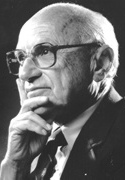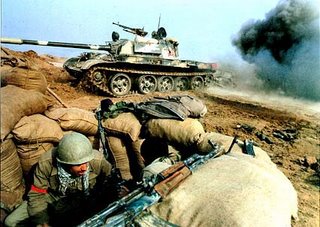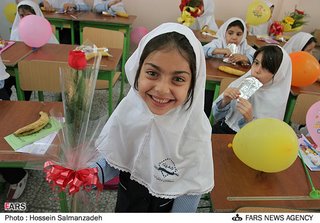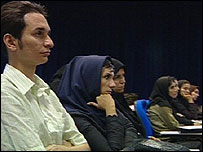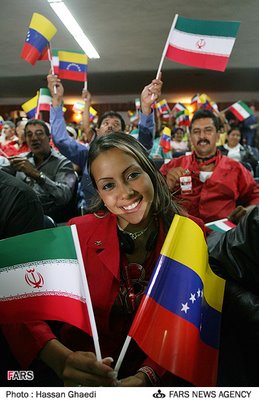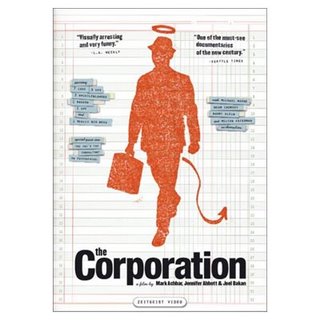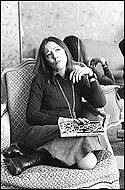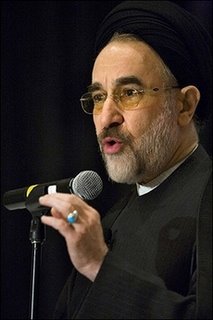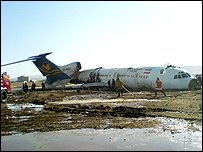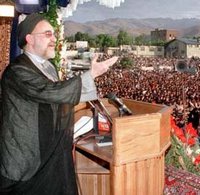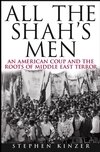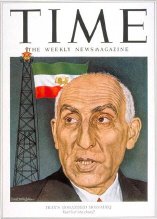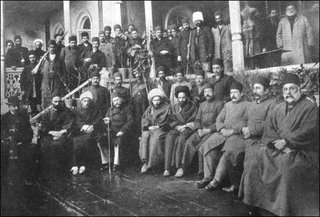
Last week Iranians went to cast their votes to elect the members of city councils and the members of the House of Experts[1]. The process was anything but doll. Still fresh from their victory in 2005 President Ahmadinegad’s supporters hoped to win the majority of councils nationwide and to dominate Tehran’s council. Since President Ahmadinegad’s rise to power had begun by becoming the mayor of Tehran, he and his supporters also wanted to block the road for potential presidential candidates; including present Mayor: Mr. Ghalibaf, a conservative technocrat who happens to be a former General of Revolutionary Guards and an aviator.
Reformers and Technocrats joined ranks for a come back. Their list included promising names such as Dr. Najafi a MIT graduate and former minister of Higher Education and former vice president and the head of Management and Planning Organization. Ironically he was Kargozaran[2]’s first choice for presidency in 2005; he decided not to run because he did not have the approval of Mosharekat, the main reformer party headed by President Khatami’s brother at the time.
While the conservatives were divided between supporters of Mr. Ahmadinegad and those of Mr. Ghalibaf, the reformers and technocrats become united after 4 years. The results were surprising. In Tehran moderate conservatives won the majority while 4 reformers including Dr. Najafi also were elected. Mr. Ahmadinegad’s supporters won 3 seats becoming a minority. Nationwide voters were divided between reformers and moderate conservatives. One cannot analyze the results in many towns and villages politically, since in many places city councilors are elected based on their local prestige and influence rather than their political conviction.
Women did well too. In provincial capital cities across country women won 43 seats out of a total of 269[3]. In Arak, Urumeye, Ardebil, Zanjan, Shiraz, Qazvin and Hamedan women candidates received the largest number of votes to become their cities' first councilors. In Shiraz the capital of Iran’s rich classic literature and the rest place of its greatest poets a 25 years old female[4] student of architecture has received the largest number of votes. It must be mentioned that in 7 provincial capital cities women have not made it to city councils.
Although many interpreted the outcome as a signal of public dissatisfaction with President Ahmadinegad’s administration, the most important development of December election in Iran is neither ultra-radicals’ failure to secure Tehran’s city council nor reformers success. The most important development of last election is the revival of moderate conservatives and reinstituting their traditional role of a stabilizer. A role that Iran’s moderate conservatives and traditional clergies have always identified themselves with. Many have noticed how Mr. Ghalibaf shared reformers’ concerns about the process of counting the votes and how he was able to act as a moderator between reformers and radical conservatives in administration.
This is not an insignificant achievement at all. Moderate conservatives advocate a market economy and are more pragmatic in dealing with international community than their radical colleagues who consider any deal a compromise of their values. Traditionally their social base has included merchants, small business owners and parts of Iran’s middle class. Polarization of Iran’s domestic policies during President Khatami administration compromised their political position and public identified them with ultra-radicals and radical conservatives. That era is over now. Centrist politics is back in Iran. That is good news indeed.
Reformers and Technocrats joined ranks for a come back. Their list included promising names such as Dr. Najafi a MIT graduate and former minister of Higher Education and former vice president and the head of Management and Planning Organization. Ironically he was Kargozaran[2]’s first choice for presidency in 2005; he decided not to run because he did not have the approval of Mosharekat, the main reformer party headed by President Khatami’s brother at the time.
While the conservatives were divided between supporters of Mr. Ahmadinegad and those of Mr. Ghalibaf, the reformers and technocrats become united after 4 years. The results were surprising. In Tehran moderate conservatives won the majority while 4 reformers including Dr. Najafi also were elected. Mr. Ahmadinegad’s supporters won 3 seats becoming a minority. Nationwide voters were divided between reformers and moderate conservatives. One cannot analyze the results in many towns and villages politically, since in many places city councilors are elected based on their local prestige and influence rather than their political conviction.
Women did well too. In provincial capital cities across country women won 43 seats out of a total of 269[3]. In Arak, Urumeye, Ardebil, Zanjan, Shiraz, Qazvin and Hamedan women candidates received the largest number of votes to become their cities' first councilors. In Shiraz the capital of Iran’s rich classic literature and the rest place of its greatest poets a 25 years old female[4] student of architecture has received the largest number of votes. It must be mentioned that in 7 provincial capital cities women have not made it to city councils.
Although many interpreted the outcome as a signal of public dissatisfaction with President Ahmadinegad’s administration, the most important development of December election in Iran is neither ultra-radicals’ failure to secure Tehran’s city council nor reformers success. The most important development of last election is the revival of moderate conservatives and reinstituting their traditional role of a stabilizer. A role that Iran’s moderate conservatives and traditional clergies have always identified themselves with. Many have noticed how Mr. Ghalibaf shared reformers’ concerns about the process of counting the votes and how he was able to act as a moderator between reformers and radical conservatives in administration.
This is not an insignificant achievement at all. Moderate conservatives advocate a market economy and are more pragmatic in dealing with international community than their radical colleagues who consider any deal a compromise of their values. Traditionally their social base has included merchants, small business owners and parts of Iran’s middle class. Polarization of Iran’s domestic policies during President Khatami administration compromised their political position and public identified them with ultra-radicals and radical conservatives. That era is over now. Centrist politics is back in Iran. That is good news indeed.
[1] Knowns as KHOBREGAAN in Iran.
[2] Kargozaran e Sazandegi Iran is the main technocrat party in Iran, advocating privatization of economy and cautious approach to social issues.
[3] Statistics are from Hamshahri Daily published in Tehran, Iran.
[4] Fatimeh Hoshmand.

